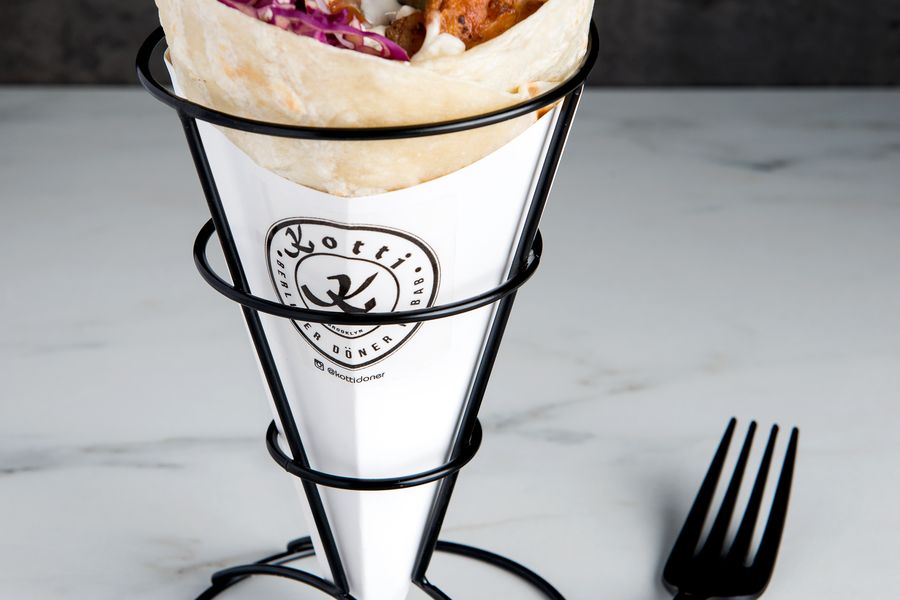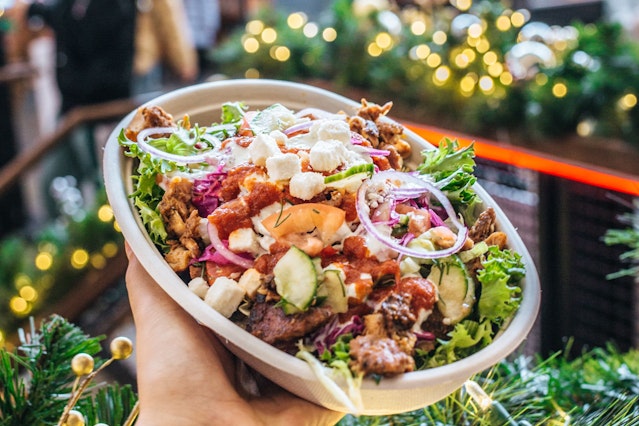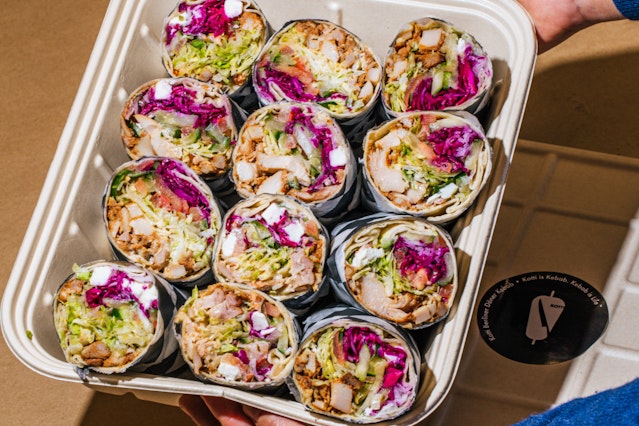Getting to Know: Kotti Berliner Döner Kebab

As we get older, our lives seem to adhere more and more to a blueprint laid out by society, our upbringing, opportunities and interests. There isn’t a set track but sometimes it feels like there is one as long as you keep doing what’s expected of you. You’ll go to school until you don’t have to anymore. You’ll get a job, move out of your parents’ house, maybe get married and have children. You’ll have dreams and maybe you’ll realize them. But more than everything else, you’ll hope to live without regrets.
Erkan Emre doesn’t seem to be someone who’s ever met a dream he didn’t think he could make reality. The Berlin native came to New York in the late 90s and never looked back. We spoke to Erkan about how his pursuit of his dreams took him from a successful career in architecture to bringing the Döner Kebab to NYC with the opening of Kotti Berliner Döner Kebab.
‘A Terribly Hopeless Dreamer’




In 1997, a 19-year-old Erkan Emre had just finished high school in Berlin and wanted nothing more than to explore the United States. Inspired by what he had seen in Hollywood movies, he had a great desire to explore a culture that was different than his own and immerse himself in the people, the music and the land.
He decided to do a 90 day backpacking tour but his curiosity and inspiration wasn’t sated. So he did what anyone would do: he stayed for 26 years.
“I really admired how people were receptive to new ideas, and I was incredibly motivated to be among like-minded, entrepreneurially spirited young people, whether or not they're artists or musicians or tech people,” says Erkan. “And I decided that this country really was more than just the 90 days backpacking tour.”
He was determined to make a life in the United States. After all, this was his dream country and it was living up to his expectations. He racked his brain for ways to make this dream a reality.
“Of course there's often so little you can do, except to keep dreaming, and I'm just a terribly helpless dreamer,” says Erkan. “Sometimes I daydream, but it also helps me to organize my thoughts on many, many levels.”
Unfortunately, this dream was butting up against another one he had since he was 14 years old: to become an architect. And Erkan being the enterprising person he is didn’t just think to himself that becoming an architect would be nice. He was much more direct. There was an architecture firm around the corner from where he grew up so he walked into the office and asked if he could intern there during his summer vacation. They said yes.
“I didn't learn the entire trade but it inspired me to become an architect and I ended up being in the US, after graduating [high school],” says Erkan. “I did an introduction to architecture class at Columbia University, which inspired me to continue that path and ended up graduating from Pratt Institute”
Two dream were achieved but after his first 14 years in the profession, Erkan was looking for more. Rather than continue to create architecture, he wanted to be on the other side - to hire an architect. He went back to school focusing on real estate finance and development. But his otherworldly work ethic would lead to the realization of another dream and the Döner Kebab.
What About (Döner) Kebab?






The origins of the Döner Kebab can be traced back to 19th century Turkey, particularly the city of Bursa. While the exact creator and origins are debated, Iskender Efendi, a renowned Turkish chef, is often credited with its invention. Iskender Efendi's innovation involved stacking seasoned lamb meat on a rotating spit, resulting in thin slices of meat served with bread, yogurt, and tomato sauce, known as "Iskender kebab."
The popularity of the Döner Kebab quickly spread throughout Turkey and eventually reached various parts of Europe and the Middle East, thanks in part to Turkish immigrants. Germany became a hotspot for the Döner Kebab's popularity, where it underwent adaptations to include a mix of lamb and chicken slices served in a bread pocket along with an array of vegetables, sauces, and condiments.
For Erkan, the Döner Kebab is like his In-N-Out Burger whenever he visits friends and family in Berlin. He lands, grabs a kebab then goes and sees them much like many folks do with In-N-Out in California. But with how busy his schedule had become, a visit wasn’t in the cards one year.
“And I said, "Well, I'm in the greatest city in the world. This is New York City. New York City has everything. This is the metropol and the city of all cities, and they have everything. Surely, I will be able to find theBerliner style that I'm used to,” says Erkan. “And I was absolutely shocked and astonished that my Google results would yield zero results.”
He was able to find various kebab spots but none that served them in the style that he was used to. So much like the 14-year-old kid that had the guts to walk into an architecture firm one day, he decided that he would do it himself. He bought a doner kebab machine, a sort of two foot tall vertical rotisserie grate, and fell madly in love with making the dish at home.
Soon he was hosting dinner parties and becoming a frequent invite to barbecues as his friends and neighbors became as enamored with the Döner Kebab as Erkan was. And while this hadn’t become a business yet, he started doing a little bit of market research amongst his friends.
“I was very intrigued by the analysis just simply because I thought "There must be more than just fulfilling my own culinary void. Wouldn't it be amazing if I could actually introduce this delicious food to New York and to New Yorkers and maybe New Yorkers who had been to Germany, coming back and asking for this?” says Erkan.
But feedback from friends wasn’t enough. Erkan had to go bigger. He hired a focus group company, borrowed a kitchen from a restaurant that he had helped design a few years prior in Brooklyn and bought more vertical rotisseries. Along with a small team, he brought his vision to life for 500 strangers who were being paid to evaluate the food and it was a hit!
“Never in my life did I think that this would be somehow a career shift in my life,” says Erkan.
‘Giving Up is Not in My DNA’







The operation that would become Kotti Berliner Döner Kebab would start small. Following the focus group, Erkan and his team would audition for Smorgasburg, a then-up-and-coming weekly food festival. There were over 1000 applicants and only 24 spaces available. The process was being covered by the food blog Eater and the journalists were asking tons of questions.
“One of the journalists was asking a question, which was towards the end of the article. Sometimes, I get around to reread some of those past journeys that we've had. And she said, "What will you do if you don't get into Smorgasburg?" And I said, "Giving up is not in my DNA. I will keep dreaming,” says Erkan. “And we did get in, and we had our first tent there in Park Slope in Brooklyn.”
This was in 2016 and Smorgasburg ran from March to October. Erkan maintained his day job at the architecture firm then rushed out on Friday evenings to begin prep to serve up to 400 people each weekend at the event.
“I was intensely busy for seven days a week for seven months nearly nonstop. But it was also the year where I learned so much about what I ended up loving, which is to be with people, but also, people that I don't know professionally,” says Erkan. “These are guests. And I felt that I was suddenly an ambassador of the cross-cultural relationship between Turkey and Germany, since many Americans were so eagerly interested to learn and understand, "What is a Berliner doner kebab?"
Since those early days, Erkan’s passion and business continues to grow. Despite closing two locations during COVID, they have opened four new ones as the world has continued to heal. And Erkan believes that the sky's the limit.
“I like taking risks. I think we have a wonderful concept, we have an incredible team,” says Erkan. “I don't think there is anything our company doesn't have - from the people, from the product, from the process - that Chipotle didn’t have in the nineties, where a father and a son did what they did to create this incredible brand, that is now Chipotle.”
With new concepts on the horizon as well as a sixth location in Chelsea opening by the end of the year, there might have been a blueprint for Erkan Emre’s life but he never settled for it. He continued to dream even if it didn’t seem like the obvious choice to make. And his community and, in some way the world at large, is better for it.
“I understand what it means to work hard. And I think giving back is so important to me. This is what I teach my children. [We gave back] when the earthquake hit Turkey and Syria, some months ago, and devastated the lives of 50,000 people. We will keep donating,” says Erkan. “We will keep being part of it. And I think it's important that we are not just a business, but that we are a community-oriented business. And that matters to me a lot.”



